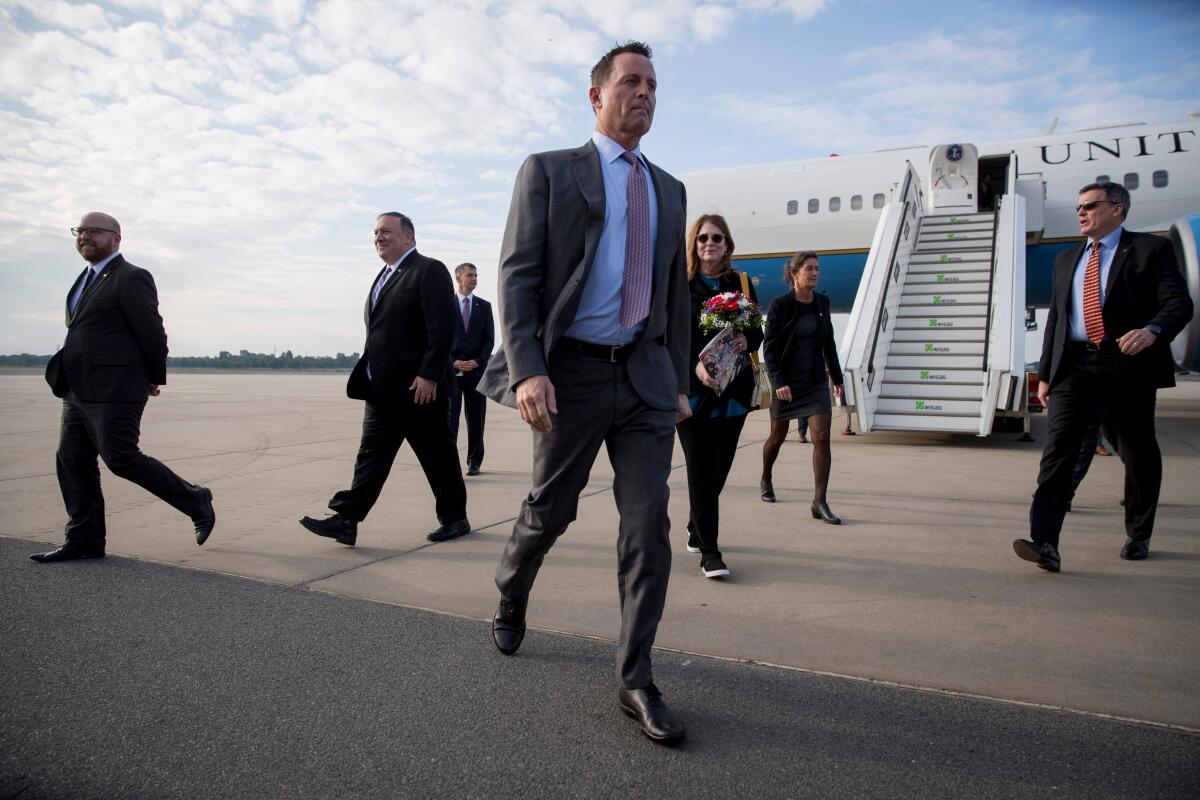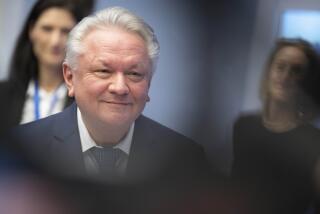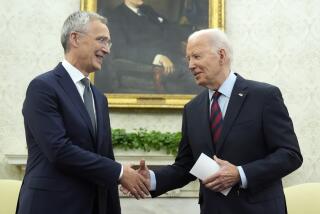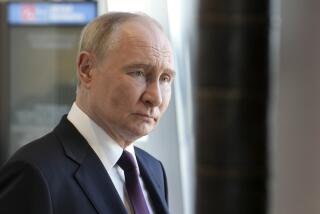U.S. envoy warns Germany: Pay more or risk losing protection

President Trump’s envoy to Berlin openly criticized Germany on Friday, accusing it of failing to pull its weight on defense spending and suggesting that the 50,000 American troops stationed in NATO’s largest European nation could be moved to Poland — a move that could raise tensions with Russia even further.
Ambassador Richard Grenell said in an interview with the German news agency DPA that U.S. patience was running out after successive U.S. presidents had in vain urged Germany — long a close NATO ally — to do more for its own security. It follows Grenell’s criticism of Germany recently for its refusal to take part in a U.S.-led naval mission in the Persian Gulf.
“It is offensive to assume that the U.S. taxpayers continue to pay for more than 50,000 Americans in Germany but the Germans get to spend their [budget] surplus on domestic programs,” Grenell was quoted telling DPA, comments which made waves in Germany and were confirmed by the U.S. Embassy.
Germany’s defense spending has long been a point of contention between the two allies. And its fighter jets, tanks and submarines are in a woeful state of disrepair. But no U.S. president or ambassador has ever spoken out as bluntly as Grenell. Trump will visit Europe twice in the next four weeks: France for a Group of 7 meeting, and then Denmark and Poland, where fears of Russian military action are more acute than in major Western European countries.
The German government has posted growing budget surpluses for the last six years, and the country’s economy, Europe’s largest, has enjoyed strong growth for nearly a decade. More than half its gross domestic product is exported. But the country with a now-deeply ingrained aversion to war and military expenditures has fallen far short of its 2014 pledge to the North Atlantic Treaty Organization to raise defense spending to 2% of GDP by 2024.
Germany, the 29-nation alliance’s second-largest member behind the U.S., has no plan in place to get to 2%. It expects to spend 1.36% of GDP on defense in 2019 and that is expected to drop to 1.24% in 2024, while most other NATO members reach the 2% target. The United States spends 3.3% of its GDP on defense.
Along with U.S. nuclear missiles based in Germany, there are more American forces in Germany than in any other country in Europe: 35,000 soldiers along with 17,000 American civilians. Some 12,000 German civilians work in jobs connected to the U.S. military.
In June, Trump said he would shift 1,000 U.S. troops from bases in Western Europe to Poland, joining about 4,000 U.S. soldiers who rotate in and out of Poland.
The U.S. ambassador to Poland, Georgette Mosbacher, recently tweeted in support of moving U.S. troops from Germany to Poland.
“President Trump is right and Georgette Mosbacher is right,” Grenell said. “Multiple presidents have asked the largest economy in Europe to share the burden of its own defense. This is a request that has been made over many years and by many U.S. administrations. We have reached a point where Americans and the U.S. president must react.”
Such a move could have far-reaching security consequences in Europe. When NATO began expanding in the 1990s to take in countries that had been Soviet satellites during the Cold War, the alliance promised not to permanently station combat forces in Central Europe unless security conditions changed, a pledge that Moscow says NATO has violated.
Since Russia annexed Crimea in 2014 and backed separatist groups in Ukraine, the Pentagon and NATO have built up forces in Central Europe, hoping to reassure nervous alliance members that the bloc would come to their defense, as promised in the NATO charter, if directly threatened by Russia. Ukraine is not a member of the alliance.
Claudia Major, a senior associate and defense analyst at the German Institute for International and Security Affairs in Berlin, said that the United States was right to single out Germany for criticism for its insufficient defense spending but warned that public criticism could damage NATO unity.
“While the criticism regarding the sad state of German defense spending in general is justified, I think we should be very careful about these debates,” she said in an interview. “Who benefits if NATO and the transatlantic community is divided? Who benefits if Trump plays off one ally against another? NATO’s enemies!”
German media reports about Grenell’s comments stirred considerable reaction. Hundreds of readers on Spiegel Online’s website applauded Grenell’s suggestion, urging him personally to leave the country along with the American forces. Several wrote “good riddance,” and some even offered to help the soldiers pack up their equipment.
“Go home … and take your Ambassador with you,” wrote a user under the name Captain Crow.
More to Read
Sign up for Essential California
The most important California stories and recommendations in your inbox every morning.
You may occasionally receive promotional content from the Los Angeles Times.






